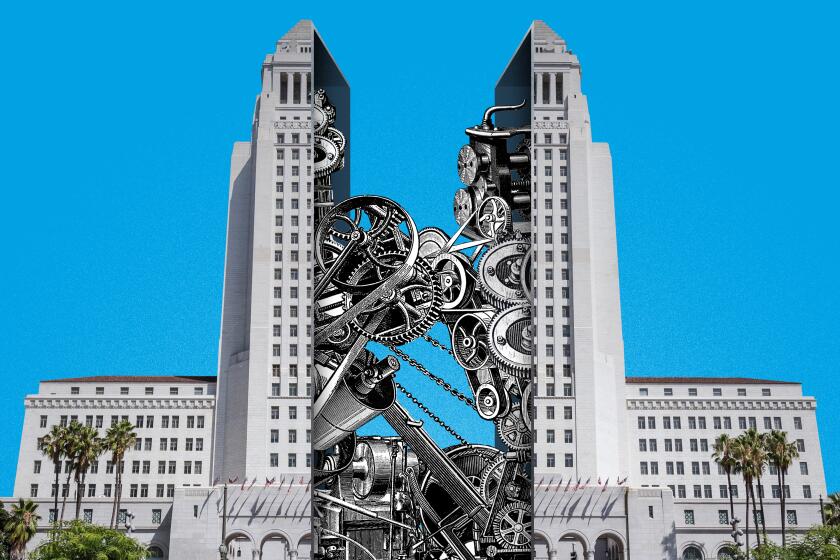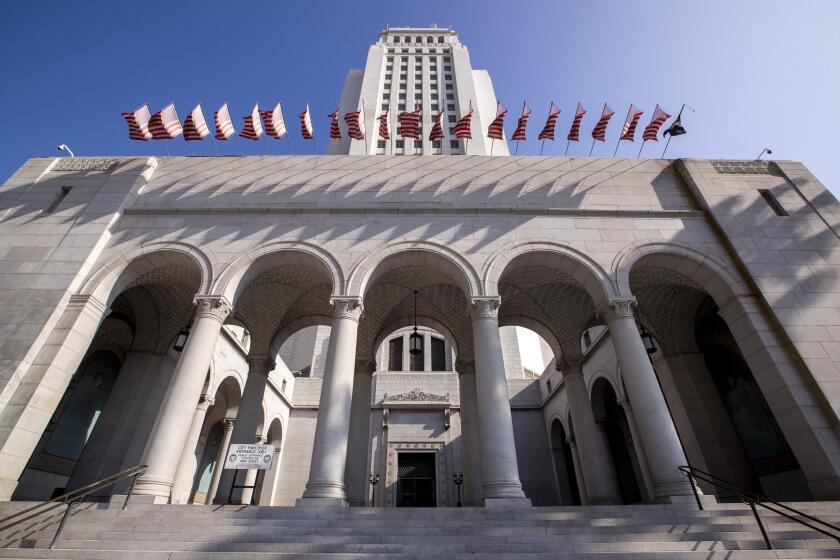Editorial: L.A. City Council just proved it can’t be trusted to fix itself

- Share via
The Los Angeles City Council showed its true self-interested colors Tuesday when it gutted key reforms to reduce corruption in City Hall and strengthen independent ethics oversight. Bowing to special interests and unwilling to relinquish power, the council instead voted to put a watered-down package of ethics policies on the November ballot.
This should have been an important turning point for L.A. City Hall, where a culture of corruption has been allowed to thrive. Half a dozen politicians and public officials have been sentenced to prison in corruption cases in the last four years. Two current council members face accusations of ethics violations. Instead, it was a show of arrogance highlighting why it’s so important that some power be wrested from the 15 council members.
Los Angeles City Hall has been rocked by scandal after scandal, but now there’s momentum to reform city government.
Last month the council’s Ad Hoc Committee on Governance Reform recommended a set of policies to strengthen the Ethics Commission, which is the city’s watchdog over elected officials and charged with enforcing campaign finance, contracting, lobbying and conflict of interest laws.
Though not as ambitious as good government advocates urged, it was a worthwhile package that included changes to make the commission more independent from the politicians it regulates. That included adding two new commissioners appointed by people other than elected officials and thus not beholden to them.
It also proposed giving the commission the authority to put proposals directly before voters when the City Council disagrees with the policy or refuses to act, though the council still would have retained enormous power to block ballot measures. Ironically, Tuesday’s action shows why bypassing the council is necessary to enact meaningful political reform in Los Angeles.
The package of reforms the L.A. City Council is considering has a problem: It doesn’t give the City Ethics Commission the independence it needs to do its watchdog job.
But even those modest changes proved too much for council members and some special interests. After a last-minute lobbying campaign led by the powerful Los Angeles County Federation of Labor, the council voted 13-2 to strip those two reforms from the November ballot measure. Council President Paul Krekorian and Councilmember Nithya Raman, who led the ad hoc committee on reform, voted against weakening the ethics package. Good for them.
It’s disappointing if not surprising that Councilmember Hugo Soto-Martinez, a former labor organizer, pushed to remove the key reforms. He said he didn’t want to delegate the council’s policy making responsibility to unelected, unaccountable Ethics Commission members. But if not them, then who? City Council members have been unwilling to pass meaningful anti-corruption reforms on their own. What could be more accountable to the public than allowing the Ethics Commission to sidestep an obstinate council and take reforms directly to voters?
The behind-the-scenes effort to kill an appointment to the city’s oversight panel shows just how much L.A. needs political and ethics reforms.
The remaining ethics reforms include raising fines for the first time in decades and setting a minimum budget for the Ethics Commission, so staff aren’t dependent on the goodwill of the people they regulate for funding. Those are positive changes, but voters deserve the chance to pass major reforms. And they probably would. Eight in 10 voters surveyed last year said the level of corruption on the City Council is concerning, and 9 in 10 believe ethics rules should be stronger.
It really looked like the City Council might agree to major changes to the city’s political system after a secret audio recording leaked in October 2022 revealing three council members, including current Councilmember Kevin de León, making deplorable and racially divisive comments. On the recording, they plotted for political power with the former federation of labor chief — the same federation that successfully lobbied this week to gut ethics reforms.
In the wake of the scandal council members introduced motion after motion proposing long-overdue fixes. Independent redistricting! A bigger City Council! Ethics reforms! Diluting council members’ power over land use! Academics and good government advocates joined the cause, producing reports, holding town halls and conducting polls. The message was loud and clear — L.A. residents want a less corrupt, more transparent and representative government.
L.A. has ambitious climate goals, and deadlines are just around the corner. Officials should be redoubling efforts, not making excuses for why they can’t be met.
And what have they gotten instead? The bare minimum. The lowest of the low hanging fruit of fixes.
As of now, the November ballot will have two reform measures — a watered-down version of the ethics package, and an independent redistricting commission similar to what the state and county already have, so City Council members can’t draw their own districts.
Proposals to expand the City Council to provide better representation and fix the city’s broken development approval process have been punted to a charter reform commission, the creation of which was approved this week by the council. The commission will spend the next two years coming up with recommendations to improve city governance with eye toward putting charter changes on the 2026 ballot.
But that commission will run into the same roadblock as ethics reformers: The City Council will ultimately decide what gets on the ballot. And you can bet there will be plenty of lobbying by interest groups to influence what changes voters are allowed to make.
The Tuesday vote proved that City Hall cannot be trusted to fix itself. If Angelenos want major change in their city government, it will take continued outside pressure and possibly a citizen-driven initiative, to make it happen.
More to Read
A cure for the common opinion
Get thought-provoking perspectives with our weekly newsletter.
You may occasionally receive promotional content from the Los Angeles Times.














